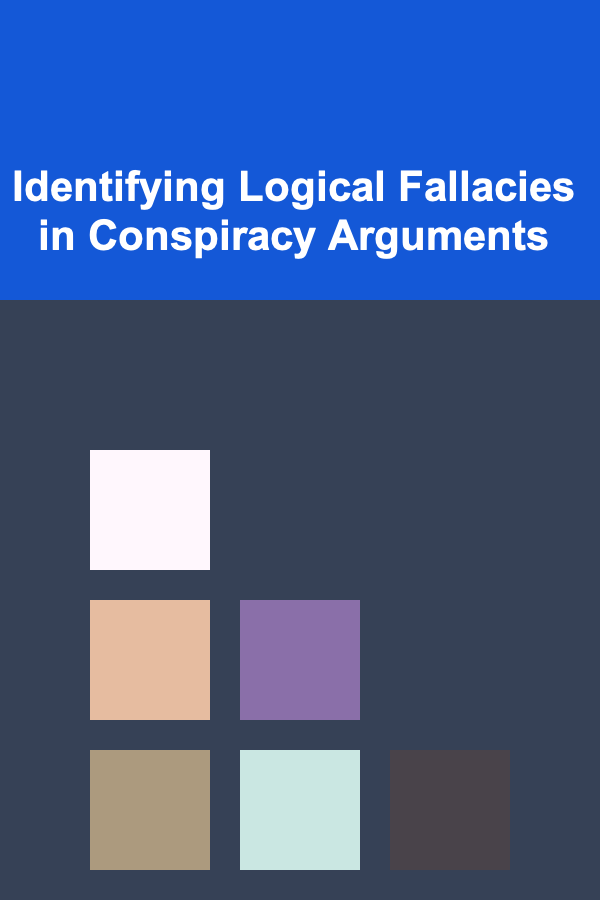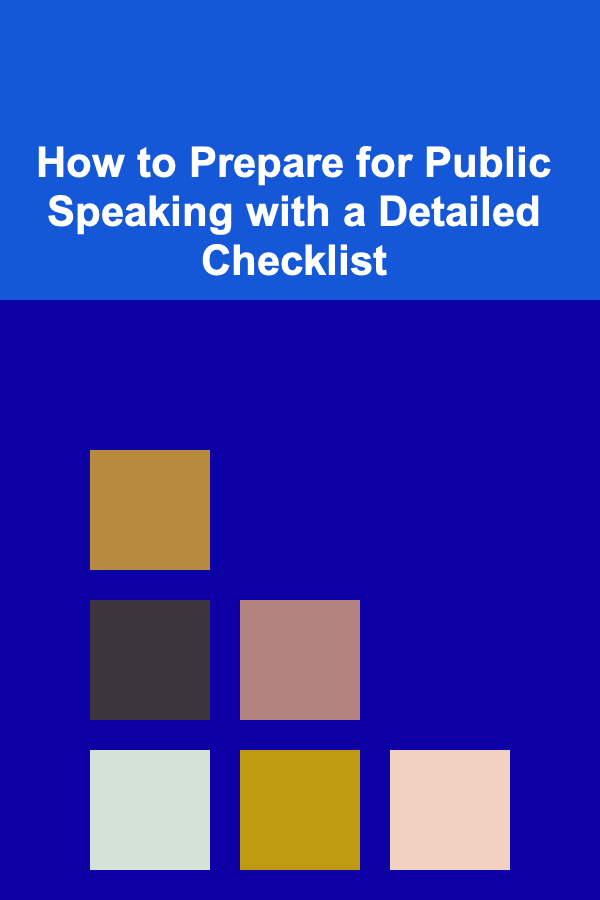
Identifying Logical Fallacies in Conspiracy Arguments
ebook include PDF & Audio bundle (Micro Guide)
$12.99$10.99
Limited Time Offer! Order within the next:

Conspiracy theories, narratives that attribute significant events or situations to secret plots by powerful and malicious actors, are pervasive in modern society. While critical thinking and skepticism are valuable tools for navigating complex information, it's crucial to distinguish between healthy questioning and falling prey to unfounded conspiracy claims. A key element in this distinction is the ability to identify logical fallacies -- flaws in reasoning that render an argument invalid. Conspiracy arguments often rely heavily on such fallacies to persuade, obfuscate, and resist scrutiny. This essay will delve into common logical fallacies encountered in conspiracy arguments, providing examples and strategies for critical evaluation.
Understanding Logical Fallacies
A logical fallacy is an error in reasoning that weakens or invalidates an argument. They are often used unintentionally, but in the context of conspiracy theories, they can be employed deliberately to manipulate belief and create a semblance of credibility where none exists. Recognizing these fallacies is paramount to assessing the validity of any claim, particularly those based on circumstantial evidence and suspicion.
Common Logical Fallacies in Conspiracy Arguments
1. Argument from Ignorance (Ad Ignorantiam)
This fallacy argues that a proposition is true simply because it hasn't been proven false, or conversely, that it's false because it hasn't been proven true. It exploits the lack of definitive evidence to support a claim.
Example: "Scientists can't definitively prove that chemtrails aren't being used to control the weather, therefore chemtrails must be real."
The burden of proof lies on the one making the claim. The absence of evidence against something doesn't automatically make it true. The logical approach is to remain skeptical until positive evidence is presented.
Critical Evaluation: Ask yourself: Who is making the claim? What evidence (beyond the absence of disproof) is offered in support? Is the burden of proof being unfairly shifted?
2. Appeal to Authority (Ad Verecundiam)
This fallacy involves citing an authority figure as evidence for a claim, even when that authority is not an expert on the topic at hand, or when there is no consensus among experts. Conspiracy theories often elevate unconventional sources or individuals with dubious credentials to positions of authority.
Example: "Dr. Wakefield, a former doctor who was discredited for his research on vaccines and autism, says vaccines cause autism. Therefore, vaccines are dangerous."
Even if the authority is qualified, appeal to authority becomes a fallacy if the authority's claim is presented as the sole justification, without considering other evidence or perspectives. Science relies on peer review and reproducibility, not just pronouncements from individuals.
Critical Evaluation: Is the cited authority a legitimate expert on the specific topic? Is there a consensus among experts in the field supporting the claim? What other evidence supports or contradicts the claim? Has the supposed authority been previously discredited?
3. False Dilemma (False Dichotomy)
This fallacy presents a situation as having only two possible options, when in reality, more possibilities exist. It often frames the choice as "either you're with us, or you're against us," forcing a simplistic and often misleading choice.
Example: "Either you believe the official government story about 9/11, or you believe it was an inside job. Since I don't believe the official story, it must have been an inside job."
This ignores the possibility that the official story may be incomplete, inaccurate, or misinterpreted, and that other explanations might exist. Complex events rarely have only two possible interpretations.
Critical Evaluation: Are there other possibilities besides the two presented? Is the situation being oversimplified? Are nuanced positions being dismissed?
4. Slippery Slope
This fallacy argues that if one event occurs, it will inevitably lead to a series of negative consequences, often without sufficient evidence to support the chain of events. It's based on speculation and fear, rather than logical reasoning.
Example: "If we allow the government to track our cell phone data for security purposes, they will eventually monitor all our communications, and then they will control every aspect of our lives, leading to a totalitarian state."
While surveillance technology raises legitimate concerns, the slippery slope fallacy exaggerates the potential consequences without demonstrating a clear causal link between the initial action and the predicted outcome.
Critical Evaluation: Is there solid evidence to support each step in the predicted chain of events? Are there safeguards in place to prevent the negative consequences? Is the argument relying on fear and speculation rather than factual evidence?
5. Straw Man
This fallacy involves misrepresenting an opponent's argument to make it easier to attack. It creates a distorted or weakened version of the original argument and then refutes that distorted version, rather than engaging with the actual argument.
Example: "Scientists say that climate change is caused solely by human activity. Therefore, they think that natural climate variations have no impact on the environment."
This misrepresents the scientific consensus on climate change, which acknowledges both human and natural factors. The straw man fallacy avoids addressing the complexities of the issue by attacking a simplified and inaccurate version of the scientific position.
Critical Evaluation: Is the argument being accurately represented? Is the counter-argument addressing the actual claims being made? Is the argument being unfairly simplified or distorted?
6. Ad Hominem
This fallacy attacks the person making the argument rather than the argument itself. It aims to discredit the person in order to discredit their claims, regardless of the validity of those claims.
Example: "You can't trust anything that journalist says about the government because he's a known conspiracy theorist."
Even if the journalist has held questionable beliefs in the past, that doesn't automatically invalidate their current reporting. The focus should be on the evidence and reasoning presented, not the person's character or past associations.
Critical Evaluation: Is the argument focusing on the merits of the claim or attacking the person making the claim? Is the personal attack relevant to the validity of the argument? Is the attack being used to distract from the actual issue?
7. Confirmation Bias
This isn't strictly a logical fallacy, but rather a cognitive bias that strongly influences how people interpret information. It refers to the tendency to seek out, interpret, favor, and recall information that confirms one's pre-existing beliefs or hypotheses, while ignoring or downplaying contradictory information. Confirmation bias is a powerful force in perpetuating conspiracy theories.
Someone who believes that the Earth is flat will actively seek out "evidence" that supports this belief, such as videos and articles from other flat-earthers, while dismissing scientific evidence that contradicts it, like satellite images and global navigation systems.
Conspiracy theorists are particularly susceptible to confirmation bias, as they often start with a strong conviction and then selectively gather evidence to support it, ignoring any information that challenges their worldview. They may interpret ambiguous events as confirmation of their suspicions.
Critical Evaluation: Are you actively seeking out diverse perspectives and evidence, even if it challenges your beliefs? Are you giving equal weight to information that supports and contradicts your viewpoint? Are you aware of your own biases and how they might be influencing your interpretation of information?
8. Anecdotal Evidence
This fallacy uses personal stories or isolated examples as evidence to support a broader claim, ignoring statistical data or systematic analysis. While anecdotes can be compelling, they are not a reliable basis for making generalizations.
Example: "My friend got sick after getting a flu shot, so vaccines must be dangerous."
A single anecdote doesn't prove a causal link between the vaccine and the illness. Many factors could have contributed to the friend's illness, and a large-scale study would be needed to determine whether there is a statistically significant correlation between flu shots and illness.
Critical Evaluation: Is the argument based on personal experience or systematic evidence? Is the anecdote representative of a larger trend? Is there statistical data that supports or contradicts the claim?
9. Correlation vs. Causation
This fallacy assumes that because two things are correlated (occur together), one must cause the other. Correlation does not equal causation. There could be a third factor influencing both, or the correlation could be purely coincidental.
Example: "There's been a rise in autism diagnoses at the same time as an increase in vaccine usage. Therefore, vaccines must cause autism."
This argument ignores the possibility that other factors, such as increased awareness and diagnostic changes, could be contributing to the rise in autism diagnoses. A correlation between vaccine usage and autism diagnoses does not prove a causal link.
Critical Evaluation: Is the argument assuming a causal relationship based solely on correlation? Are there other possible explanations for the observed correlation? Is there evidence of a causal mechanism?
10. Argument from Motive
This fallacy assumes that someone's actions are necessarily suspect because they have a motive to act in a certain way. While motive can be a relevant factor in investigations, it cannot be the sole basis for concluding guilt or deception.
Example: "The government wanted to invade Iraq for oil, therefore the 9/11 attacks were an inside job orchestrated by the government to provide a pretext for the invasion."
While the government's desire for oil may be a valid point of discussion, it doesn't prove that the government was responsible for the 9/11 attacks. This fallacy jumps to a conclusion based on assumed motives without providing supporting evidence.
Critical Evaluation: Is the argument relying solely on motive to prove a claim? Is there independent evidence to support the claim beyond the assumed motive? Is the connection between the motive and the alleged action plausible?
11. Cherry-Picking Evidence
This involves selectively presenting only the evidence that supports a particular conclusion, while ignoring or suppressing evidence that contradicts it. Conspiracy theories often rely on cherry-picked data to create a distorted picture of reality.
Presenting a few isolated cases of vaccine injuries as evidence that vaccines are dangerous, while ignoring the overwhelming body of scientific evidence showing that vaccines are safe and effective.
Cherry-picking creates a biased and misleading narrative by selectively highlighting favorable evidence and concealing unfavorable evidence. It prevents a balanced and objective assessment of the issue.
Critical Evaluation: Is the argument presenting a comprehensive overview of the available evidence? Are there alternative interpretations of the presented evidence? Is there evidence that contradicts the claim being made?
12. Special Pleading
This fallacy involves applying a double standard, where one's own actions or beliefs are excused while similar actions or beliefs of others are criticized. Conspiracy theorists often use special pleading to deflect criticism of their own flawed reasoning.
"It's okay for me to distrust the mainstream media because they're biased, but you're being naive if you trust independent sources that confirm my beliefs, because they're the only ones telling the truth."
This argument creates a self-serving justification for selectively accepting information that supports a pre-existing belief, while dismissing contradictory information based on arbitrary criteria.
Critical Evaluation: Is the argument applying a consistent standard of evaluation to all evidence and perspectives? Is there a double standard being used to excuse one's own actions or beliefs? Is the argument attempting to create an unfair advantage for a particular viewpoint?
Strategies for Critical Evaluation
Identifying logical fallacies is a crucial skill, but it's only one part of the process of critically evaluating conspiracy arguments. Here are some additional strategies to employ:
- Be skeptical of extraordinary claims: Extraordinary claims require extraordinary evidence. Demanding rigorous proof is not being closed-minded; it's being rational.
- Check your sources: Are the sources reliable and credible? Are they biased in any way? Look for peer-reviewed research, reputable news organizations, and expert opinions.
- Consider alternative explanations: Is there a simpler or more plausible explanation for the events or situations being discussed? Occam's Razor suggests that the simplest explanation is usually the best.
- Look for evidence of independent verification: Has the claim been independently verified by multiple sources? Confirmation from multiple sources strengthens the credibility of the claim.
- Be aware of your own biases: Are you approaching the information with an open mind? Are you willing to consider evidence that challenges your beliefs? Recognizing your own biases is essential for objective evaluation.
- Understand the burden of proof: The burden of proof lies on the person making the claim, not on the person questioning it. Those promoting the conspiracy theory must provide evidence to support their claims, not simply demand that others disprove them.
- Look for patterns of disinformation: Conspiracy theories often share common characteristics, such as reliance on vague language, emotional appeals, and unsubstantiated claims. Recognizing these patterns can help you identify potential disinformation.
- Engage in respectful dialogue: Even if you disagree with someone's beliefs, try to engage in respectful dialogue. Avoid personal attacks and focus on the evidence and reasoning being presented. A constructive conversation can help both parties better understand the issue.
Conclusion
Conspiracy theories can be alluring because they offer simple explanations for complex problems and appeal to our desire for control and understanding. However, succumbing to these narratives without critical evaluation can lead to misinformation, distrust, and even harmful consequences. By understanding common logical fallacies and employing strategies for critical evaluation, we can become more discerning consumers of information and better equipped to navigate the complex and often confusing landscape of modern society. The ability to identify flawed reasoning is not just about debunking conspiracy theories; it's about fostering critical thinking skills that are essential for making informed decisions in all aspects of life.

How to Make Use of Under-Bed Storage for Pet Supplies
Read More
How to Prepare for Public Speaking with a Detailed Checklist
Read More
How to Use Leftover Ingredients Creatively in Meal Prep
Read More
The Do's and Don'ts of Job Searching in a Digital World
Read More
How To Practice Forgiveness for Small Grievances
Read More
Cooking Healthy Meals for Weight Loss: A Comprehensive Guide
Read MoreOther Products

How to Make Use of Under-Bed Storage for Pet Supplies
Read More
How to Prepare for Public Speaking with a Detailed Checklist
Read More
How to Use Leftover Ingredients Creatively in Meal Prep
Read More
The Do's and Don'ts of Job Searching in a Digital World
Read More
How To Practice Forgiveness for Small Grievances
Read More